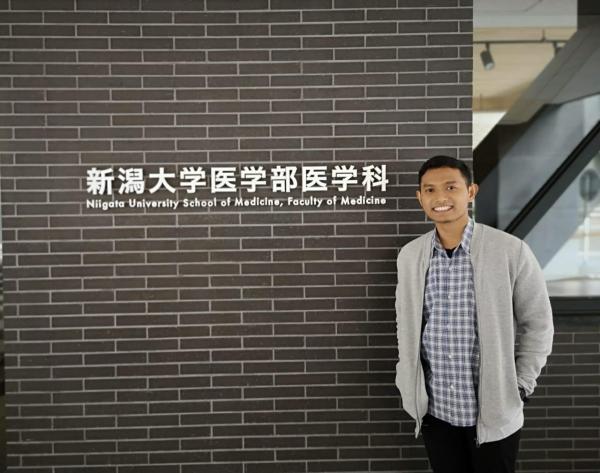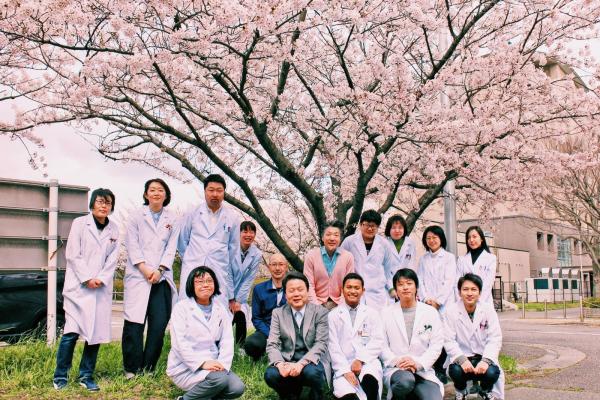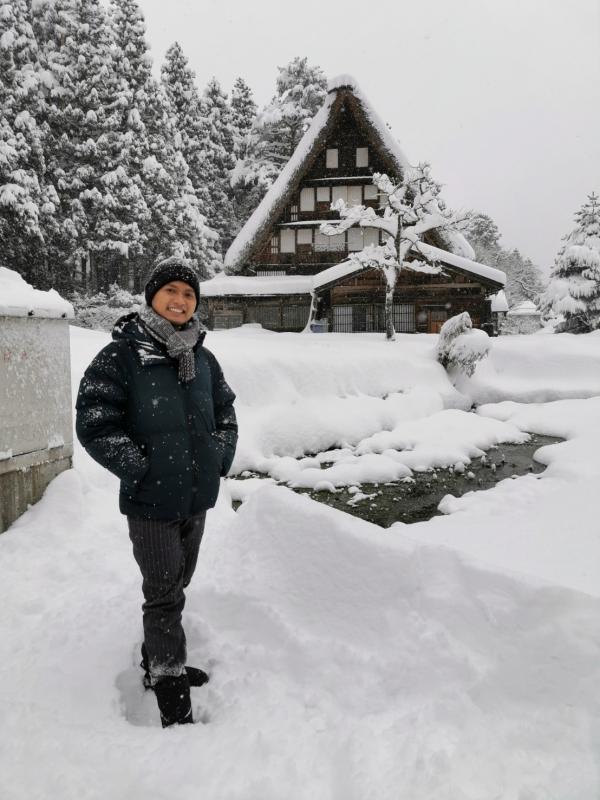Student Voice

Yusran Ady Fitrah
Nationality
Indonesia
University/Institution Name
Niigata university
Department/Faculty
Department of Molecular Genetics, Brain Research Institute
Period of study abroad
October 2019 - September 2023
What did you do before studying in Japan?
Research assistant in Central Hospital in South Sulawesi and assistant lecturer
Why did you chose to study in Japan?
Japan has long been regarded as one of the world's most academically advanced civilizations, and studying in Japan has been a goal of mine since senior high school. When I received my Medical Doctor, I was offered an opportunity to study in Japan. It is the most suited country for my study interests in neurology in the elderly. Because research on the elderly, particularly neurodegenerative illnesses, is still uncommon in Indonesia, I intend to earn my highest degree here.
How did you prepare for studying in Japan? Please tell us about how/when you found the information on institutions, supervisor, scholarship or how you applied for.
 I was suggested from a former lecturer at Hasanuddin University (an institution where I belong) that Niigata University offered a Ph.D. course in Neuroscience, so I prepared all of the necessary documents, including the enrolment form, research interest proposal, certificate of study, English proficiency certificate, medical check-up result, and so on, and sent them to Niigata University. Then, some weeks after the materials were received, an interview took place. After the results were released, one of Niigata University's supervisors assigned me to a supervisor who is an expert in my study subject of interest (my current professor). Until my departure to Japan, I had an e-mail communication regarding my studies plans, Etc. Thankfully, Niigata University offered me a MEXT scholarship after I received my acceptance letter, so MEXT funded all of my living expenses and tuition fees.
I was suggested from a former lecturer at Hasanuddin University (an institution where I belong) that Niigata University offered a Ph.D. course in Neuroscience, so I prepared all of the necessary documents, including the enrolment form, research interest proposal, certificate of study, English proficiency certificate, medical check-up result, and so on, and sent them to Niigata University. Then, some weeks after the materials were received, an interview took place. After the results were released, one of Niigata University's supervisors assigned me to a supervisor who is an expert in my study subject of interest (my current professor). Until my departure to Japan, I had an e-mail communication regarding my studies plans, Etc. Thankfully, Niigata University offered me a MEXT scholarship after I received my acceptance letter, so MEXT funded all of my living expenses and tuition fees.
How is your student life in Japan? Please tell us about your study, research, friends, part-time job, learning Japanese language, way to spend holidays, any challenges and how to overcome them and others.
 I'm researching neurodegenerative illnesses including Alzheimer's, Corticobasal degeneration, and progressive supranuclear palsy, among others. We're using genomic analysis to look for pathologic characteristics. Fortunately, my supervisor accepted me as a research assistant at the lab, so in addition to working on my own study, I have been able to analyze samples from other laboratories and hospitals around Japan.
I'm researching neurodegenerative illnesses including Alzheimer's, Corticobasal degeneration, and progressive supranuclear palsy, among others. We're using genomic analysis to look for pathologic characteristics. Fortunately, my supervisor accepted me as a research assistant at the lab, so in addition to working on my own study, I have been able to analyze samples from other laboratories and hospitals around Japan.
My laboratory colleagues are really nice and constantly go out of their way to assist me during my studies and even when I'm not on campus. Even though I don't speak Japanese, they make some effort to communicate with me in English, which I appreciate. We go together for lunch or coffee on occasion. In addition, I discovered my Muslim community, and every Saturday, we gather at the mosque to pray together.
During the first year, I was learning Japanese twice a week at a basic level, but due to the pandemic, I was unable to continue my studies due to my experiment and other projects, so I simply watched anime or participated in volunteer activities to gradually improve my Japanese.
In my spare time or on extended vacations, I travel throughout the Hokuriku region, and before the epidemic, I visited Kyoto and Tokyo to stroll around picturesque locations and learned about Japan's diverse cultures. So far, my life in Japan has been both enjoyable and challenging. This is my first time living away from home for an extended period of time, so I need to strike a balance between my college life and my personal time to stay sane. To get over the problems, such as losing my wallet and letters confusion, that I occasionally have, the assistance of my supervisors, seniors, and friends has always been helpful.
Any message and/or advice to those who wish to study in Japan?
As long as we can manage our time, studying in Japan is both educational and fun. If you have the opportunity to study in Japan, seize it and give it your all.


 I was suggested from a former lecturer at Hasanuddin University (an institution where I belong) that Niigata University offered a Ph.D. course in Neuroscience, so I prepared all of the necessary documents, including the enrolment form, research interest proposal, certificate of study, English proficiency certificate, medical check-up result, and so on, and sent them to Niigata University. Then, some weeks after the materials were received, an interview took place. After the results were released, one of Niigata University's supervisors assigned me to a supervisor who is an expert in my study subject of interest (my current professor). Until my departure to Japan, I had an e-mail communication regarding my studies plans, Etc. Thankfully, Niigata University offered me a MEXT scholarship after I received my acceptance letter, so MEXT funded all of my living expenses and tuition fees.
I was suggested from a former lecturer at Hasanuddin University (an institution where I belong) that Niigata University offered a Ph.D. course in Neuroscience, so I prepared all of the necessary documents, including the enrolment form, research interest proposal, certificate of study, English proficiency certificate, medical check-up result, and so on, and sent them to Niigata University. Then, some weeks after the materials were received, an interview took place. After the results were released, one of Niigata University's supervisors assigned me to a supervisor who is an expert in my study subject of interest (my current professor). Until my departure to Japan, I had an e-mail communication regarding my studies plans, Etc. Thankfully, Niigata University offered me a MEXT scholarship after I received my acceptance letter, so MEXT funded all of my living expenses and tuition fees. I'm researching neurodegenerative illnesses including Alzheimer's, Corticobasal degeneration, and progressive supranuclear palsy, among others. We're using genomic analysis to look for pathologic characteristics. Fortunately, my supervisor accepted me as a research assistant at the lab, so in addition to working on my own study, I have been able to analyze samples from other laboratories and hospitals around Japan.
I'm researching neurodegenerative illnesses including Alzheimer's, Corticobasal degeneration, and progressive supranuclear palsy, among others. We're using genomic analysis to look for pathologic characteristics. Fortunately, my supervisor accepted me as a research assistant at the lab, so in addition to working on my own study, I have been able to analyze samples from other laboratories and hospitals around Japan.